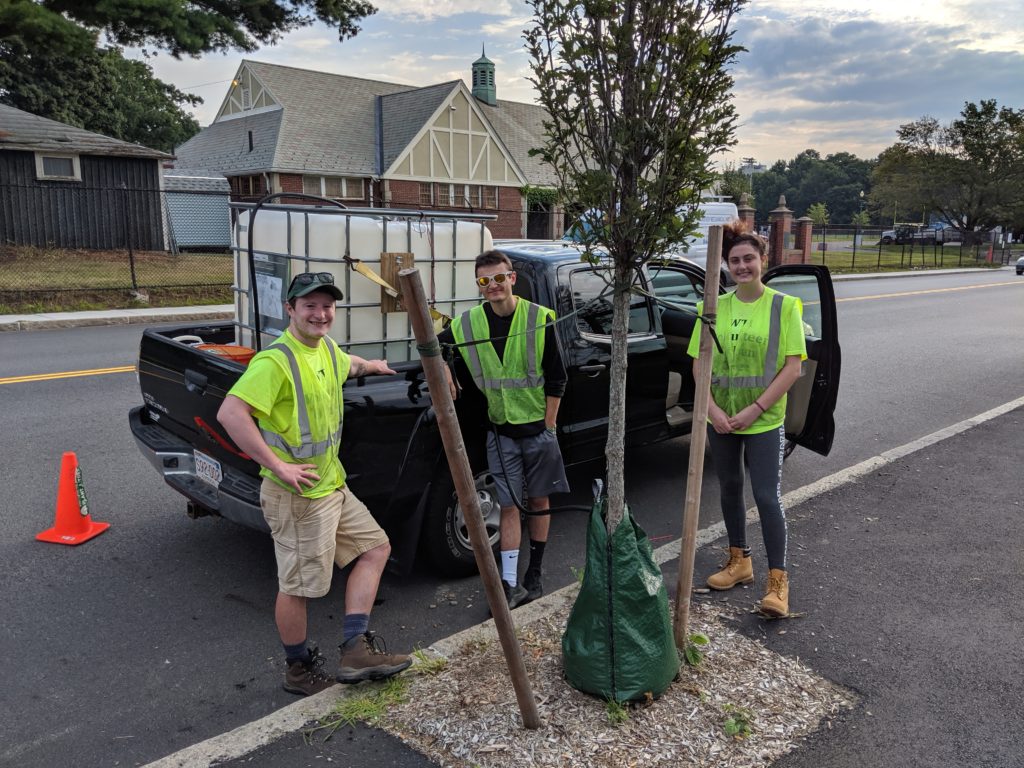
By Robbie Franklin
The Young Adult Foresters (YAF) program concluded this week after eight weeks of tree watering. I spent this last week reflecting on my time supervising the program as I wrapped up my final duties of the summer. Two things stuck out while thinking about the program. The first was how relevant the work we did was to climate change conversations in the media this summer, and the second was how well the YAF program functioned as a community development and youth development project. I feel that the YAF program succeeded by having a positive impact on Worcester’s urban forest as well as on the lives of young people living in the city.
This summer was an interesting time to work on a tree watering project. Tree plantings were regularly in the news over the last couple months, beginning with a paper published in Science referenced by The Washington Post (Parker, July 23, 2019), Time (July 4, 2019), Aljazeera (July 4, 2019) and others that claimed the most cost-effective solution to global warming is to plant 1 trillion trees. Shortly afterwards, on July 20th, a reforesting effort in Ethiopia planted 350 million trees in one day. Urban forests also made noteworthy news as an article in the Boston Globe (Crawford, 2019) on August 16th discussed the importance of urban forests in combating climate change and the challenges to maintaining urban forests that led to Boston abandoning its goal of planting 100,000 trees by 2020. Each of these news stories inspired more interesting conversations with residents and helped the Young Adult Foresters program feel more relevant. Tree planting was at the center of climate change discussions throughout the summer and we were able to contribute to this discourse by watering 400 trees each week. We were able to learn what it takes to make the tree planting projects suggested in the news successful after trees have been planted and I feel numerous neighborhoods in the city benefited from our work.
As a graduate of the Community Development and Planning program at Clark University, I was excited to see so much overlap between my work in class and my work this summer. In my graduate program we discussed the importance of linking community development and youth development projects because they a) provide youth with the agency and skills necessary to impact change in the neighborhoods they live in and b) improve buy-in for those projects to be successful down the road. Growing and maintaining Worcester’s urban forest is a job that will require educated and engaged community members to be successful. Judging by the forestry and arboricultural skills the YAFs learned from the training sessions they attended throughout the summer and the conversations we had in the truck regarding environmental justice and sustainability, the Young Adult Foresters program helped develop strong advocates for urban and community forests.
Being able to experience how successful connecting youth development and environmental services was in the YAF program strengthened my confidence in using similar project designs in environmental justice and community development projects moving forward. I enjoyed waking up each morning this summer to work with the Young Adult Foresters to help support Worcester’s urban forest, and I look forward to using the lessons I learned supervising the program on the next environmental justice project I work on in the city.
Robbie Franklin was the Watering Crew Supervisor for the Young Adult Foresters this summer.
